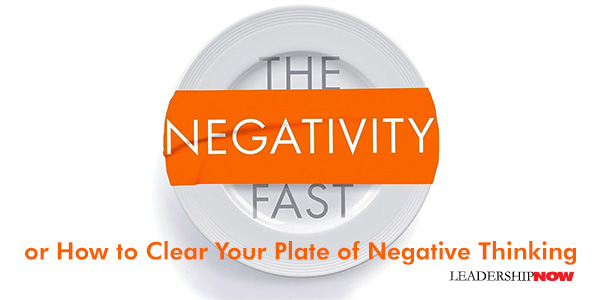 |
 |
05.17.24

The Negativity Fast or How to Clear Your Plate of Negative Thinking
WE are inclined to place a lot of weight on negative thoughts—far more than our positive thoughts. Our brains are wired for it. It’s called the negativity bias. And today it seems like we are thinking more negative thoughts than positive ones. And it’s not just us. Everyone seems more negative than they used to be, if not downright cranky. It becomes a vicious circle. We infect them with negativity, and they infect us too. How do we turn this around? Life is too short to spend most of our time immersed in negativity. Former negativity addict Anthony Iannarino wrote The Negativity Fast to help us implement a practical strategy to be more positive more of the time—to help us let things go. Iannarino covers ten behaviors that impact our relationship with negativity, like negative self-talk, complaining, empathy, gratitude, social media, and the way we frame what happens to us. To be sure, not all negativity is bad. We often have good reason to be negative. It is an appropriate response. But when we remain in a negative state of mind, we’re in trouble. Sometimes, we “talk” ourselves into a negative emotional state. We catastrophize events and situations. We assume the worst because we’re afraid things aren’t going to meet our expectations. Speaking of expectations, we often assume the worst of other people’s motives. You see, sometimes we’re negative precisely because we lie (even just to ourselves) about other people. We insist that they’re intentionally creating problems for us, and malice can be their only motive. One way to reduce your stress is to lie to yourself about why people do things that bother you. If you can remember a time when you were not at your best, even in public, you can empathize with them rather than throwing the first stone. Empathy is key for dealing with other people if you don’t want to get caught up in the drama. Another strategy is radical acceptance. Iannarino explains: You might have a difficult person or an event that triggers negativity. By accepting that it is what it is without judging it, you let it go. You don’t have to agree with a person to forget or forgive. Radical acceptance allows you to set it down and leave it right where it is. Being able to accept as they are, you accept that someone or something isn’t fair or that something should be different. Complaining puts you in a victim mentality and can place others in an environment that others perceive as toxic. Accept things as they are, and don’t complain. “One of the best ways to stop complaining is to turn your attention to solving the problem, addressing a challenge, or fixing what is broken. Instead of focusing on what’s wrong, you start to figure out what needs to change and how best to make things better.” When we complain, we are pointing out something that needs attention. The key here is that your complaint should be the beginning of a meaningful process. After you voice concern, you need to do something about it. On the other side of complaining is gratitude. Gratitude puts us in a positive frame of mind. We are looking for things to be thankful for in spite of what is happening around us. It shifts our focus. Reframing is the act of turning something negative into a positive lesson. You create a narrative that makes you stronger after a negative event. The traumas we experience can only limit us when we invest negative meaning into these events, telling and retelling the story. Your story or my story can be one of surviving and overcoming, or it can be one we tell ourselves to explain why we are something less after trauma. One way to be less negative is to reframe your negative events and traumas. Reframing involves addressing our assumptions about the world around us. “This means that one rebuilds one’s assumption world, incorporating the trauma information, but being able to find a new meaning or positive angle with this change in one’s life.” Our physical health affects our mental state. If you want to be more positive, you need to take care of yourself. The SHED anacronym helps you to remember the key areas of concern. Sleep (“the best meditation is sleep”), Hydration (drink more water), Exercise (it releases the feel-good endorphins and gives you more energy), and Diet (think less processed foods). When helping others, it’s hard to feel negative. “If you want to boost your self-esteem and dopamine, choose—kindness and prosocial behavior.” The Negativity Fast Challenge Over the course of 90 days, focus on eliminating as many sources of negativity as possible and replace them with something positive. Minimize or eliminate social media and other triggers in your life. Identify what triggers you. Which of the behaviors listed above could you work on? The world brings all kinds of surprises, including negative surprises. Remember, the goal here is not to be negative when situations call for negativity. The goal is to remove the sources of negativity that poison your mindset and reduce the quality of your life. You may revert to negative thinking in the middle of the challenge. That’s okay. Start over. The goal is not to be perfect but to reduce the negative thinking in your life. 
Posted by Michael McKinney at 07:17 AM
|
BUILD YOUR KNOWLEDGE


How to Do Your Start-Up Right STRAIGHT TALK FOR START-UPS 
Grow Your Leadership Skills NEW AND UPCOMING LEADERSHIP BOOKS 
Leadership Minute BITE-SIZE CONCEPTS YOU CAN CHEW ON 
Classic Leadership Books BOOKS TO READ BEFORE YOU LEAD |